This article needs additional citations for verification .(May 2019) |
| Engel im Fegefeuer | |
|---|---|
| Directed by | Herrmann Zschoche |
Release date |
|
| Country | East Germany |
| Language | German |
Engel im Fegefeuer is an East German film. It was released in 1964.
This article needs additional citations for verification .(May 2019) |
| Engel im Fegefeuer | |
|---|---|
| Directed by | Herrmann Zschoche |
Release date |
|
| Country | East Germany |
| Language | German |
Engel im Fegefeuer is an East German film. It was released in 1964.

Karl Marx was a German-born philosopher, political theorist, economist, historian, sociologist, journalist, and revolutionary socialist. His best-known works are the 1848 pamphlet The Communist Manifesto and his three-volume Das Kapital (1867–1894); the latter employs his critical approach of historical materialism in an analysis of capitalism, in the culmination of his intellectual endeavours. Marx's ideas and their subsequent development, collectively known as Marxism, have had enormous influence on modern intellectual, economic and political history.
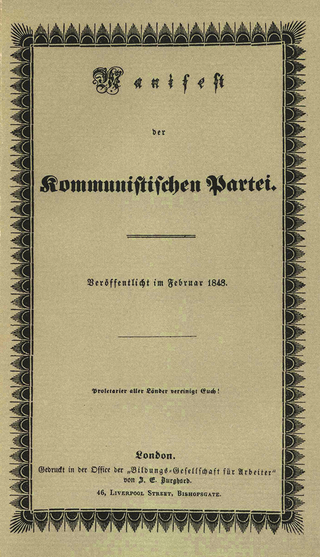
The Communist Manifesto, originally the Manifesto of the Communist Party, is a political pamphlet written by Karl Marx and Friedrich Engels, commissioned by the Communist League and originally published in London in 1848. The text is the first and most systematic attempt by Marx and Engels to codify for wide consumption the historical materialist idea that "the history of all hitherto existing society is the history of class struggles", in which social classes are defined by the relationship of people to the means of production. Published amid the Revolutions of 1848 in Europe, the Manifesto remains one of the world's most influential political documents.

Friedrich Engels was a German philosopher, political theorist, historian, journalist, and revolutionary socialist. He was also a businessman and Karl Marx's closest friend and collaborator, serving as a leading authority on Marxism.
This article contains information about the literary events and publications of 1552.
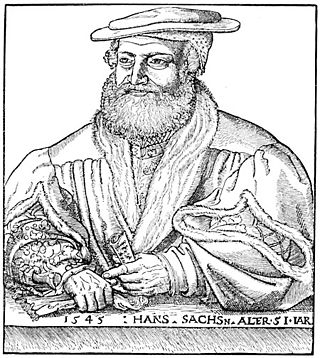
Hans Sachs was a German Meistersinger ("mastersinger"), poet, playwright, and shoemaker.

Lujo Brentano was an eminent German economist and social reformer.

The Origin of the Family, Private Property and the State: in the Light of the Researches of Lewis H. Morgan is an 1884 anthropological treatise by Friedrich Engels. It is partially based on notes by Karl Marx to Lewis H. Morgan's book Ancient Society (1877). The book is an early historical materialist work and is regarded as one of the first major works on family economics.

Marianne Sägebrecht is a German film actress.

The Holy Family is a book written by Karl Marx and Friedrich Engels in November 1844. The book is a critique of the Young Hegelians and their trend of thought, which was very popular in academic circles at the time. The title was a suggestion by the publisher and is meant as a sarcastic reference to the Bauer Brothers and their supporters. The book created a controversy with much of the press and caused Bruno Bauer to refute the book in an article which was published in Wigand's Vierteljahrsschrift in 1845. Bauer claimed that Marx and Engels misunderstood what he was saying. Marx later replied to his response with his own article that was published in the journal Gesellschaftsspiegel in January 1846. Marx also discussed the argument in chapter 2 of The German Ideology.
Alexander Engel, birth name: Kurt Engel was a German film actor. He appeared in more than 70 films between 1932 and 1968. He was born in Berlin, Germany and died in Saarbrücken, West Germany. He chose the stage name "Alexander", to prevent confusion with the popular musician Kurt Engel.
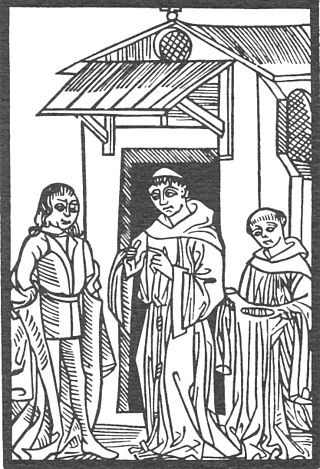
Tractatus de Purgatorio Sancti Patricii is a Latin text written about 1180–1184 by a monk who identified himself as H. of Saltrey. The author is traditionally known as Henry, though this was an insertion and invention of Matthew of Paris and has been contested in the influential work of historian Jacques le Goff. H de Saltrey was a Cistercian in Huntingdonshire.
Siegfried Weiss was an East German actor.

Sarah Engels, known as Sarah Lombardi from 2013 to 2021, is a German pop singer and television personality. She is best known for participating in season 8 of Deutschland sucht den Superstar, where she was eliminated from the Top 10, only to return two shows later and eventually become the runner-up.
Radikal jung – Das Festival junger Regisseure is an annual weeklong German theatre festival at the Münchner Volkstheater, Munich. It began in 2005, as a forum and stage for the next generation of directors.

The German Ideology, also known as A Critique of the German Ideology, is a set of manuscripts written by Karl Marx and Friedrich Engels around April or early May 1846. Marx and Engels did not find a publisher, but the work was retrieved and first published in 1932 by the Soviet Union's Marx–Engels–Lenin Institute. The book uses satirical polemics to critique modern German philosophy, particularly that of young Hegelians such as Marx's former mentor Bruno Bauer, Ludwig Feuerbach, and Max Stirner's The Ego and Its Own. It criticizes "ideology" as a form of "historical idealism", as opposed to Marx's historical materialism. The first part of Volume I also examines the division of labor and Marx's theory of human nature, on which he states that humans "distinguish themselves from animals as soon as they begin to produce their means of subsistence".
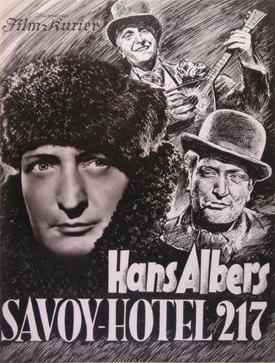
Savoy Hotel 217 is a 1936 German mystery drama film directed by Gustav Ucicky and starring Hans Albers, Brigitte Horney and Alexander Engel. It was shot at the Babelsberg Studios in Potsdam. The film's sets were designed by the art directors Robert Herlth and Walter Röhrig. The costumes were by Herbert Ploberger. It premiered at Berlin's UFA-Palast am Zoo.

Ida of Nivelles was a beatified Cistercian nun and mystic.
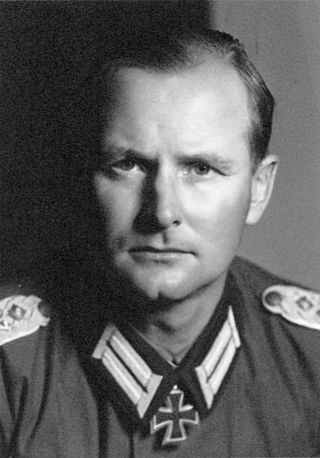
The Infantry Division Ulrich von Hutten was an infantry division of the German Wehrmacht during World War II, comprising the Army (Heer), Navy (Kriegsmarine), and Air Force (Luftwaffe). The Wehrmacht had numerous divisions, including infantry, armored, and other specialized units, which were involved in various military campaigns throughout the war. It was formed at the end of March 1945, just over a month before the end of the war. The division was named after German Protestant reformer Ulrich von Hutten (1488–1523).

"Gott hat mir längst einen Engel gesandt" is a 1996 Christian song with text by Eugen Eckert, set for a four-part choir by Thomas Gabriel as part of the rock oratorio Daniel. It became a hymn of the genre Neues Geistliches Lied, which is contained in several hymnals and songbooks.
Fastnachtspiel was a type of play performed on Shrove Tuesday or fastnacht during the sixteenth century as a part of pre-lenten carnivals. Extant examples mostly originated from the city of Nuremberg and Hans Sachs was considered the most prolific in this form. Though sometimes performed on stage, fastnachtspiele were most often performed on the street or town square as a part of the carnival celebration. Productions usually lacked props and only had simply scenery. Fastnachtspiele typically used preexisting stories from ancient or medieval works which were adapted to contemporary conditions. Playwrights like Sachs took major inspiration from the Decameron and earlier burlesque stories.